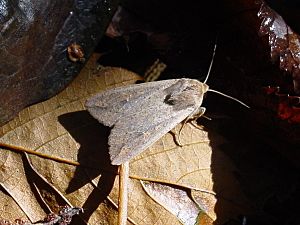Mythimna (moth) facts for kids
Quick facts for kids Mythimna (moth) |
|
|---|---|
 |
|
| Mythimna unipuncta | |
| Scientific classification |
|
| Kingdom: | Animalia |
| Phylum: | Arthropoda |
| Class: | Insecta |
| Order: | Lepidoptera |
| Superfamily: | Noctuoidea |
| Family: | Noctuidae |
| Tribe: | Leucaniini |
| Genus: | Mythimna Ochsenheimer, 1816 |
| Synonyms | |
|
|
Mythimna is a large group, or genus, of moths. These moths belong to the family called Noctuidae, which is one of the biggest families of moths. A scientist named Ferdinand Ochsenheimer first described this group of moths in 1816.
Contents
About Mythimna Moths
Mythimna moths are found all over the world. They are often active at night, which means they are nocturnal. Many of them have dull, brownish colors. This helps them blend in with their surroundings. Their colors make them hard to spot during the day.
What do they look like?
Most Mythimna moths are medium-sized. They have wings that are usually shades of brown, gray, or straw-yellow. Some species have small dots or lines on their wings. These markings can help you identify them. The Mythimna unipuncta, for example, is known as the white-speck moth. It has a tiny white dot on each forewing.
Where do they live?
Mythimna moths live in many different habitats. You can find them in grasslands, forests, and even gardens. They are quite adaptable. Some species are found in specific regions. Others, like the white-speck moth, can be found across many continents.
Life Cycle of a Moth
Like all moths, Mythimna moths go through a life cycle with four main stages:
- Egg: The female moth lays tiny eggs. She often places them on plants.
- Larva (Caterpillar): The eggs hatch into larvae, which are caterpillars. These caterpillars spend their time eating and growing. They shed their skin several times as they get bigger. Many Mythimna caterpillars feed on grasses and other low-growing plants. Some are known as "armyworms" because they can appear in large numbers.
- Pupa: After growing enough, the caterpillar forms a pupa. This is a resting stage. Inside the pupa, the caterpillar changes into an adult moth.
- Adult Moth: The adult moth emerges from the pupa. Its main job is to find a mate and lay eggs. This starts the cycle all over again.
Some Common Mythimna Species
There are many different species within the Mythimna genus. Here are a few examples that you might hear about:
- Mythimna unipuncta – This is the white-speck moth. It's a well-known species.
- Mythimna pallens – Also called the common wainscot.
- Mythimna ferrago – Known as the clay moth.
- Mythimna impura – The smoky wainscot moth.
- Mythimna convecta – This one is sometimes called the common armyworm. Its caterpillars can sometimes cause damage to crops.
See also
 In Spanish: Mythimna para niños
In Spanish: Mythimna para niños

